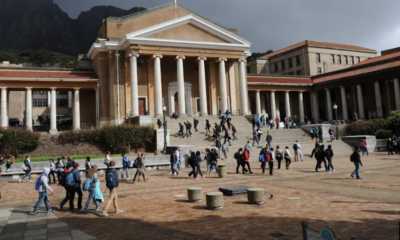
News

UCT prof forced to retire over exam question
Anton Fagan, the WP Schreiner Professor of Law at the University of Cape Town (UCT), who set an exam question in May depicting a fictional terrorist attack at a Jewish school, has been forced to take early retirement after the exam question led to a petition calling for him to be investigated and fired.
“As a consequence of the question that I set for my delict students in their recent examination, I was asked to move my retirement forward from the end of next year [2025] to the end of June 2024,” Fagan told the SA Jewish Report in late June. “Having been persuaded that it would be in the law faculty’s and my best interests to do so, I agreed.”
Fagan has written several reasoned and rational opinion pieces in support of Israel, against the barbarism of Hamas, and questioning the strongly anti-Israel stance of UCT, which also led to a hostile environment for him at UCT.
“We all know which views about Israel and Hamas are orthodox, and which are no longer tolerated within South African universities,” wrote Emeritus Professor of Philosophy at UCT, David Benatar, regarding Fagan’s early retirement.
South African Jewish Board of Deputies (SAJBD) analyst Adam Charnas says, “The SAJBD considers UCT’s approach to the position of Professor Anton Fagan to be draconian and heavy-handed. Considering Professor Fagan’s strong academic reputation, it seems that this decision is biased, due to his political support for Israel. We observe that UCT has become increasingly hostile towards any perspective that doesn’t align with a very narrow stance on Israel/Palestinian issues, and we view this action as bullying rather than constructive.”
Looking back on the chain of events, Fagan says, “The examination containing my delict question was written on 23 May. The next day, an organisation calling itself UCT4Palestine launched an online petition describing the question – and me as the person who had drafted it – as Islamophobic, racist, and genocidal.
“Three days after that, the Law Students’ Council [LSC] lodged a complaint with the dean of the law faculty, in which it claimed that the question had been ‘triggering and traumatising’, that it had been intended to push a specific political agenda, and that my setting it had amounted to a violation of my professorial responsibilities and an abuse of my professorial power,” he says.
“Four days later, the dean sent me an email proposing that I take early retirement from 1 July. I rejected the proposal,” says Fagan. “A week later, in a face-to-face meeting which he scheduled, the dean urged me to reconsider. He informed me that my delict question was tearing the law faculty apart and that, if I remained, I would inevitably be investigated for misconduct.
“He also gave me the impression that, in such investigation, neither he nor my head of department would support me,” he says. “On the basis that it would be in the law faculty’s and my best interests to do so, I relented to take early retirement.”
At no stage before or after Fagan took this decision “was I asked to respond to the LSC’s complaint. However, a week and a half after I met the dean, I sent a detailed response to him, my law faculty colleagues, and my students. A version of this response was published as ‘Sturm und drang in a UCTeacup’ on Politicsweb.”
In addition to UCT4Palestine’s petition and the LSC’s complaint, there was also an LSC-run questionnaire sent out about the question. “Of the 32 students [out of a class of 213] who completed the questionnaire, 27 made similar allegations to those in the petition and complaint,” says Fagan.
“That aside, I faced no overt hostility,” he says. “When my early retirement was made public by the dean, several law faculty colleagues whom I expected to contact me about it didn’t. I had for many years been on good terms with these colleagues. But their views about the war in Gaza are diametrically opposed to mine. It’s possible that these colleagues’ failure to contact me reflects some hostility towards me on their part.”
Meanwhile, “two of my students expressed support, one in a chance face-to-face encounter, the other in an email. I received expressions of support from four or five law faculty colleagues and three or four former law faculty colleagues. About 10 other people, some former members of UCT but not the law faculty, also contacted me to express support.”
Advocate Mark Oppenheimer, whom Fagan supervised in his LLB thesis, says, “Professor Fagan was undoubtedly the greatest legal mind at UCT, and his departure from the law faculty is a great loss for his colleagues, his students, and legal academia. He’s the professor who had the greatest influence over my own legal thinking, and I owe my clarity of thought and precision in legal writing to his enormous influence.”
Regarding how he feels about his career at UCT ending this way, Fagan says, “I have no regrets and would do the same again. Excluding my five years as a student, I spent 28 and a half years at UCT. The first 20 were golden years, and I wouldn’t have wanted to be anywhere else.
“It was less pleasurable from 2015 onwards,” he says. “There were the Rhodes Must Fall and Fees Must Fall protests. Then there was the COVID-19 pandemic. Then we had protests again, as well as a malfunctional university leadership. Ironically, this year was the first since 2015 that I managed to get through my delict lectures without disruption. I was just starting to count my chickens when the uproar about my delict question began.”
For now, Fagan will probably continue his academic writing, hopefully as an emeritus professor in UCT’s department of private law.
“This series of events revealed the fact that some LLB students at UCT hold irrational and uninformed views about the war in Gaza,” says Fagan. “But that doesn’t distinguish them from many students elsewhere in the world, including at leading universities like Harvard, Columbia, and Oxford.
“Moreover, some of these LLB students’ predecessors have been no less irrational and ignorant about other matters. More significant – and worrying – is the fact that similarly irrational and uninformed views about the war in Gaza appear to be held by a substantial number of UCT academics, as was shown by the two propositions concerning the war which were adopted by the UCT Senate and subsequently endorsed by the UCT Council.”
Benatar notes that “Professor Fagan’s early retirement is an immense loss to UCT, and the circumstances of his decision to take early retirement once again highlight both the institution’s intolerance of ‘unorthodox’ views and its culture of bullying. It’s once again clear that all the talk about ‘diversity’ and ‘inclusion’ amount to empty words.”
UCT spokesperson Elijah Moholola told the SA Jewish Report, “UCT confirms that Professor Anton Fagan took voluntary early retirement after serving as a distinguished academic at the university for close to three decades. UCT greatly appreciates the many years of contribution he made to teaching, learning, and research at the university.”











David (UCT Law Graduate)
July 18, 2024 at 7:55 pm
Professor Anton Fagan is an intellectual and moral giant. His brilliance is matched by his humility, decency and courage. Someday (hopefully), UCT, to which he gave so much, will look back in shame on its treatment of this academic titan and mensch.
Joshua
July 23, 2024 at 9:44 am
Fagan was pushed out because he holds views that are aligned with a form of western terrorism (zionism) that has no place on a university campus. His lack of ability to expand his worldview to include those who aren’t like him, or at the very least view them as requiring equality, is morally repugnant. It’s telling that as students advocated for the expansion of greater forms of justice since 2015, he found it UCT to be a difficult space. Fagan might be clever, but he certainly lacks any deep wisdom or broad empathy
John doe
July 25, 2024 at 12:27 pm
What Joshua said
Kyda
July 25, 2024 at 2:45 pm
Good riddance. He has no business being a professor in an educational institution with his racist outlook manipulating innocent minds, encouraging support of a genocide which has been ruled by the highest court in the world. Does he think he is above the law? Typical colonizer mindset.